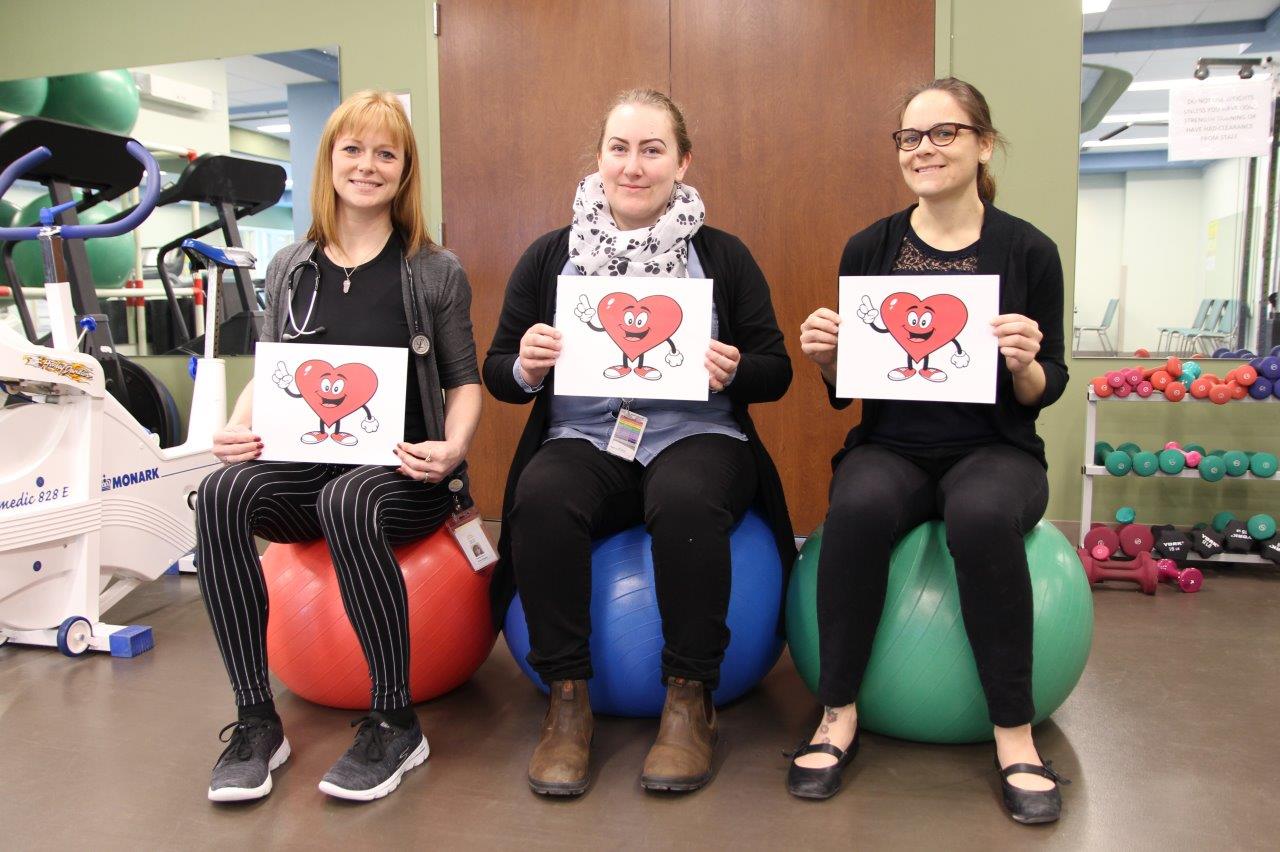Show Your Heart Some Love
Published Monday, February 3, 2020

Katherine Chisholm, Kinesiologist, Rae-Anne Robinson, Social Worker, and Nicole Strong, Registered Dietitian are with the Rehabilitation and Healthy Lifestyles Program at our Hospital.
By Sarah Chadwick
What do you know about your heart health? Currently, 9 out of 10 Canadians are living with a heart disease risk factor, without knowing it. February is Heart Month and staff with the Rehabilitation and Healthy Lifestyles Program at Thunder Bay Regional Health Sciences Centre (our Hospital) want you to show your heart some love in order to help prevent heart disease.
Let’s start with the basics - what are heart disease risk factors? They are lifestyle factors that contribute to our heart health. Some of these risk factors are non-modifiable, like age, sex, ethnicity, and heritage, family and personal medical history, and personal/environmental circumstances. However, you are in luck. The other risk factors are modifiable, meaning that simple changes in your daily routine can help to prevent heart disease from occurring or happening again:
Exercise and Physical Activity: “It’s simple, just move” said Katherine Chisholm, Kinesiologist at our Hospital. “You should be getting at least 150 minutes of exercise each week. That’s about 30 minutes, 5-7 times per week. If you can’t complete 30 minutes all at once, try breaking it up into smaller bouts throughout the day to accumulate your minutes.”
Obesity: Currently 60% of Canadian adults are overweight, doubling their risk for developing heart disease. “Even where you hold your weight, specifically around the waist, can increase your risk for heart disease,” continues Chisholm. “Try setting weekly goals to track your exercise and diet, and monitor your progress by measuring your waistline. You’d be surprised how a routine like this can make a difference.”
Healthy Eating: “Being aware of your eating habits can help to reduce your overall risk and can help manage blood pressure, cholesterol or triglycerides, and diabetes,” states Nicole Strong, Registered Dietitian at our Hospital. “Be mindful of portion sizes, and what’s in your food - the ingredient list is great for this. Also, be cautious of foods that have added sugars, salts, and fats, and focus more on a minimally processed diet, with a variety of nutrient dense foods including vegetables, fruits, whole grains, legumes, nuts/seeds, and lean meats.”
Being Smoke-Free: Smoking triples your risk for developing heart disease. “If you are currently a smoker, any reduction in smoking can improve your overall health,” said Strong. “There are smoking cessation programs available throughout the city, and are offered at some family health teams, the Thunder Bay District Health Unit, and within the programs at our Hospital.”
Limiting Your Alcohol: Canada’s Low Risk Alcohol Drinking Guidelines recommend no more than 2-3 drinks per day. “Alcohol intake increases your risk of heart disease, may make symptoms of a pre existing disease worse, and can even affect how some medications work in the body,” said Strong.
Stress: Understanding stress and how it affects the body is important to your heart health. “Education and being able to identify the negative stress in your life is the first step,” said Rae-Anne Robinson, Social Worker at our Hospital. “Try setting realistic goals, identify the patterns that trigger your stress, practice deep breathing or relaxation exercises, invest time in positive self care, and ask for help from a support network or professional if you can’t manage your stress alone.”
Take control of your health for Heart Month 2020. Talk to your primary care provider today to learn more about your heart disease risk factors. For more information about how to help prevent heart disease, visit: www.heartandstroke.ca/heart/risk-and-prevention/lifestyle-risk-factors